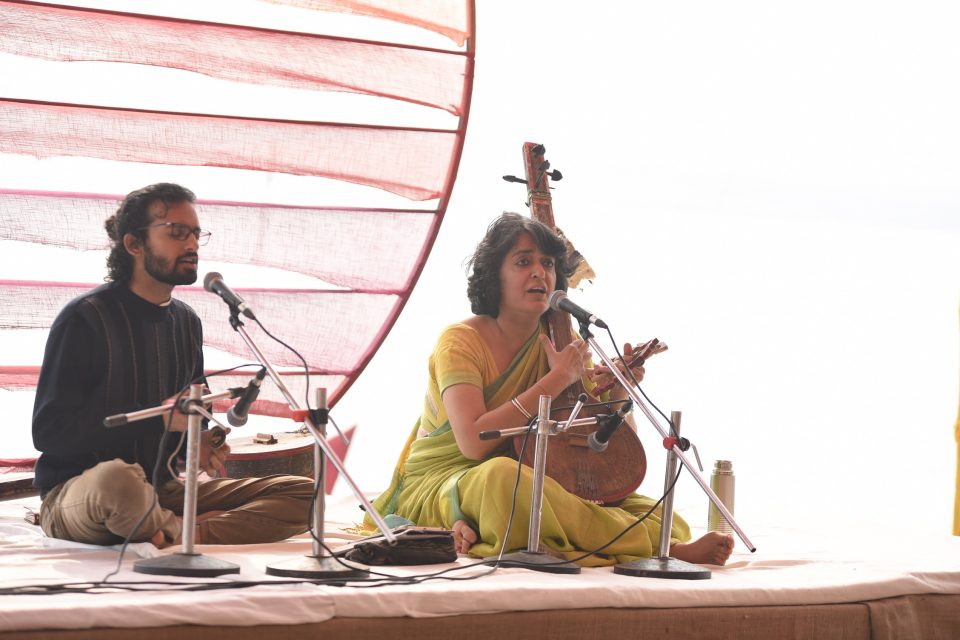Two Days of Classical, Folk and Fusion at the Mahindra Kabira Festival, Varanasi
The experiential festival held on the ghats of the Ganga river expands its scope slightly for the fourth edition with varying results

The Kabir Project's Swagath Sivakumar and Shabhnam Virmani (from left) perform at the morning session on day two of Mahindra Kabira Festival. Photo: Courtesy of Mahindra Kabira Festival 2019
There’s a clock tower by the Tulsi Ghat in Varanasi which was oddly striking 10:10 even though it was clearly 6 pm in the evening and we were heading out to the Mahindra Kabira Festival’s (held on November 23rd and 24th) evening stage at the nearby Guleria Ghat. As the boat waded into the waters, a closer look showed that the clock was, in fact, painted on.
Whether it’s the clocks that don’t tell time, the diyas that make their way on to the Ganga river or the 24-hour cremations that take place, Varanasi is a surreal place most of the time. Some ghats are lit up with bizarre hues of dark green and red, enticing you as though it was housing a nightclub, while in the day you can see faded graffiti and murals (probably tagged by foreign visitors) on the walls and plenty of Siberian gulls.
Amidst the daily temples reverberating with chants and the Ganga aarti each evening, the Mahindra Kabira Festival perhaps aims to add to the culture and sound of Varanasi. Now in its fourth edition, the two-day festival provides an all-round experience of sorts – from Indian classical, folk and fusion music to literary sessions to food and heritage walks. They all, in some way or another, tie into the teachings and life of poet-saint Kabira.
To the orange hue of the sky, reflected in the Ganga, Mahindra Kabira Festival’s morning sessions call on instrumentalists and vocalists to ease in the day. Sitarist Neeraj Mishra from the Benaras gharana scaled a few high notes, but more as a trick, saving the real surprise of a ghazal rendition last. Especially mindful of the legacy of Kabira, New Delhi-based vocalist Ujwal Nagar (whom we’ve heard previously with New Delhi fusion band Advaita) was careful to preface his set with an apology in case he made any mistakes in interpretation. With evocative versions of “Chali Meri Sakhi,” Nagar took a while to get into the groove of things, but was in amicable form by the time he got on to familiar renditions such as “Moko Kahaan” and “Chadariya Jheeni Re Jheeni.”

Flautist Pandit Ajay Prasanna on day one of Mahindra Kabira Festival. Photo: Courtesy of Mahindra Kabira Festival 2019
Later in the afternoon, under the searing heat, theater and screen actor K.C. Shankar was wrapped in a few layers and wore a turban to get into storyteller mode with fellow Jashn-E-Qalam partner Vicky Ahuja. Perhaps presenting a different way to imbibe Kabira’s life and times, their story plays showcased the literary side of the Mahindra Kabira Festival.
Of course, it’s fair to say that even though the poet-saint is ever-relevant, but does it mean his work is an endless repository to draw from for art? Mahindra Kabira Festival certainly thinks so, even if it won’t curate exclusively Kabira-centric work from their performers. At the Shivala Ghat, seasoned flautist Ajay Prasanna, for example, delivered a sublime fusion performance – joined by two bansuri players plus percussive action from his tabla player and drummer over a bed of keys. He spent the final 15 minutes of his set diving into experimental, jazz fusion and smile-inducing melodies.
Kamal Sabri, too, was setting the mood just right for the evening with tabla artist Pranshu Chaturlal, and while his performance wavered, his collaboration with American singer Kristin Hoffmann paired operatic highs and raags quite well. Perhaps this was the kind of spontaneous collaboration that the festival needed.
On day two, there was an enlightening pairing of flute and Hindustani classical violin between Rakesh Kumar and Sarada Prasan Das to kick off the morning stage at Guleria Ghat. Kumar, an assistant professor in flute at the Benares Hindu University and Das, currently pursuing his PhD from the same place as well, there was easy rapport that once again eased 200-odd attendees into the day.

Unity Earth’s Pato Banton and Antoinette Rootsdawtah on stage on day two of Mahindra Kabira Festival. Photo: Courtesy of Mahindra Kabira Festival 2019
Far more enlightening and even entertaining was Shabnam Virmani and Swagath Sivakumar’s performance titled “Yeh To Ghar Hai Prem Ka: Love in the times of Hate” that followed. Virmani, the founder of the long-standing multimedia arts undertaking Kabir Project, eloquently delved into love and transience in Kabira’s work, through a Gypsy-like voice and a folksy tambura-manjira (hand-held cymbal) combo that traversed Rajasthani, Sindhi and Malwa music traditions. Sivakumar even introduced what he called a “gangster bhajan,” as the duo led with poetry that showcased the fiercer side of the saint-poet, in which Kabira asks everyone to steer clear and not tread on him.
The festival closed with its most diverse showcase of music in the evening session at Shivala Ghat – first, the kids of Sunbeam School, followed by Rajasthani folk vocalist Omprakash Nayak, rousing, feel-good reggae/hip-hop and new age music from Unity Earth’s MC Pato Banton, keyboardist Antoinette Rootsdawtah (plus an introductory performance from Hoffmann) and the affable Gujarati folk vocalist Mooralala Marwada. While his as-advertised collaboration with Mumbai rock band Neeraj Arya’s Kabir Café didn’t transpire, the folk-fusion group were more than happy to own the stage with what was perhaps the loudest volumes for the night.
As tourists, delegates and Varanasi residents too got down and broke into a jig for Unity Earth and Kabir Café, it marked a success of sorts for the Mahindra Kabira Festival – Raman Iyer of Kabir Café noted that “Kabir was the original rockstar” and that can only mean the relevance of the saint-poet continues to be tapped into, amidst a perfect setting.







